Message

- Shigenori Yamauchi
Chairman of the Board
CEO (left) - Mitsuru Okada
Member of the Board
President CEO (right)
STEP I mid-term
management plan — Making
Vision
for the Future a reality
Introduction Reflecting on FY2014 Corporate Vision/ Policies CSR Outlook and Dividends
Reflecting on Fiscal Year 2014
Proactively strengthening our global supply network to better meet global aluminum demand.
The global demand for flat rolled products is expected to continue to grow steadily. In terms of individual regions, in line with the remarkable economic growth in Asian markets, demand is expected to grow in all fields; particularly for consumer goods such as can stock and foil. Looking to the transportation industry, demand is also expected to increase in regions such as North America, Central America and Europe, where the call for lighter weight automobiles, aircraft and other vehicles is on the rise.
In order to better meet this growing global demand, the UACJ Group has been reinforcing its global supply network with three hubs—one each in Thailand, the USA and Japan—acting as the center for their respective regions.
In fiscal 2014, we continued with the second phase of construction for fully-integrated manufacturing at the Rayong Works of UACJ (Thailand) Co., Ltd. (UATH), our core plant in Asia. We also actively engaged in capital investment in North America, where we have entered a joint venture with a leading European company to establish a manufacturing and sales company for automotive body-in-white (BiW) panels.
Regarding results, despite an equipment breakdown at the Logan Mill of Logan Aluminum Inc. in North America, with the post-merger expansion of business scope beginning in the second half of fiscal 2013, results greatly surpassed the previous term. Net sales for fiscal 2014 were ¥572.5 billion (a 57.3% increase compared to the previous term, or a 7.0% increase using the combined basis*). In terms of profits and losses, operating income was ¥23.7 billion (a 33.2% increase for the same term, or a 5.2% decrease using the combined basis), and ordinary income was ¥21.3 billion (a 27.0% increase for the same term, or a 0.9% decrease using the combined basis).
Net income for the term, however, was ¥8.6 billion (a 13.0% decrease for the same term, or a 26.5% decrease using the combined basis). This result reflects financial reporting in the previous term, in which marginal profits of ¥6.1 billion related to the step acquisition of Tri-Arrows Aluminum Holding, Inc. and Tri-Arrows Aluminum, Inc. were included in calculations.
*Combined total for former Furukawa-Sky Aluminum Corp. and former Sumitomo Light Metal Industries Ltd. in the first half of fiscal 2013. Tri-Arrows Aluminum Holding Inc. was reclassified, changing from a company accounted for using the equity method to a consolidated subsidiary.
Mid-term Management Plan
The mid-term management plan explains tangible strategies for global growth in response to the expanding aluminum market.
Step I: Reinforce Foundation in Order to Achieve Our Long-term Vision
The end of this fiscal year marks one-and-a-half years since our former companies were merged in October 2013. Since that time, in March 2014, we announced the UACJ Group Vision for the Future, which sets forth the main goal of the merger: namely to become an aluminum industry leader in a competitive global market. Then in December 2014, the UACJ Group Global Step I mid-term management plan was formulated. This plan expands on the policies of the UACJ Group Vision for the Future, stipulating strategies for each business sector. The first stage in our roadmap for achieving the goals of our long-term vision, Global Step I, focuses on reinforcing foundations over the plan's three-year term, fiscal 2015-2017 (Fig. 1).
In preparing this plan, we carefully considered the progress we have made towards Group unity, synergies and global expansion since the merger, and made a close analysis of the projected market environment during the plan's term.
Global demand for flat rolled products is expected to continue to grow steadily, especially in regions such as Asia, North and Central Americas, and Europe. Competition is also expected to grow more severe, with rolled aluminum manufacturers engaging in large-scale plant and equipment investment in regions worldwide. Fuel and energy prices are also expected to continue to rise.
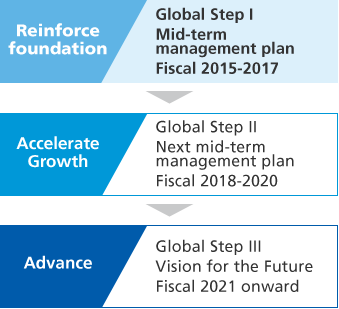
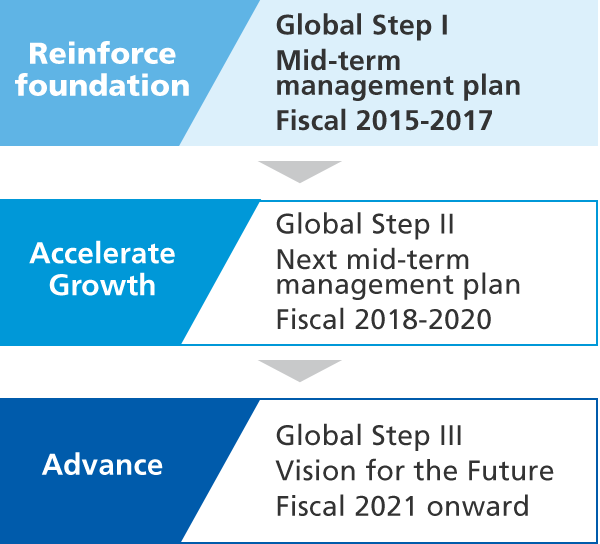
In light of this market environment, the mid-term management plan introduces three major polices for the Group: (1) Expand growth products in the transportation field—focusing on automobiles—and the energy field, and strengthen business in growth regions such as Asia; (2) Construct an optimal production network for each business sector utilizing the synergies created through unification; and (3) Develop unique technologies and products by applying our vast technological prowess to fundamental research.
In addition to formulating and implementing tangible measures for each business sector in line with these policies, we will move forward strengthening our global sales network, developing new technologies and products, training human resources capable of excelling on the global stage, and carrying out strategic capital investment. This approach will surely enable us to achieve the objectives set forth in the mid-term management plan.
Policies and Measures for Each Business Sector
Based on the three major policies of Vision for the Future, in the Group's core business of sheet products, we are working to construct an optimal global production network, create technological synergies and bring large-scale strategic investments into play as early as possible.
In Thailand, the second phase of construction—covering processes from casting to rolling—at the Rayong Works of UATH has been completed. Fully-integrated manufacturing began at the works in August 2015. In order to meet the thriving demand in Asian markets, the original plans for the Rayong Works were increased in scale, in terms of both quality and volume. As a leading integrated manufacturing plant in Asia, combining high quality with low cost, the Rayong Works will make a significant contribution to improving the global competitiveness of the UACJ Group.
Aluminum demand is expected to increase further in the future. We are currently working to establish a supply network capable of meeting this demand, targeting a yearly capacity of 200,000 tons by 2017. We are also exploring further capital investments to raise that capacity to 300,000 tons.
In North America, the use of aluminum BiW panels has been increasing rapidly as the result of stricter fuel efficiency regulations. In response, we set up a joint venture in the USA to manufacture and supply automotive BiW panels. Plant construction for the new company is currently underway, and operations are scheduled to commence in fiscal 2016. The plan is for annual capacity to be 100,000 tons, enabling the company to meet automotive manufacturers' needs by supplying high-quality products.
In Japan, restructuring by reallocating product mixes at domestic manufacturing bases is also underway, with reorganization expected to be completed in fiscal 2016. Specifically, we plan to increase productivity by aggregating rolling processes at the Fukui and Nagoya works, and specialize in thick plate and finishing processes at the Fukaya Works, and finishing processes at the Nikko Works. This will enable us to transfer surplus equipment that is not being used to overseas plants, thus minimizing overall capital expenditures. Further increases in demand for the thick plate used in the construction of LNG tankers are also expected, and this restructuring will enable us to produce the plate at the Fukaya Works as well as the Fukui Works.
In conjunction, we will also expand leading technologies and quality management systems at individual plants to other locations. This will enable production costs to be lowered by reducing energy consumption, and improving efficiency and yield.
In other areas as well, we are proceeding with measures based on matching each business environment and its strengths, as well as maximizing synergies between businesses in order to contribute to realizing sustainable growth and maximum Group profits.
Strategic Capital Investment Focused on Growth Regions
Our capital investment plan, which is designed to establish a foundation for greater growth, calls for spending at the scale of ¥90 billion over the three-year period, fiscal 2015-2017.
Approximately 60% of expected investment is targeted for growth areas and regions. Among growth areas, one of the leaders is the transportation industry, where aluminum parts continue to be introduced to meet the need for lighter weight automobiles, aircraft and other vehicles. Growth regions include areas such as Asia and the Middle East, where incredible economic growth is leading to increased demand in all fields, but especially in consumer goods such as can stock and foil.
While focusing on strategic investment in these fields, we will also be reducing upkeep, renovation and other general expenditures by reallocating product mixes at manufacturing bases in Japan.
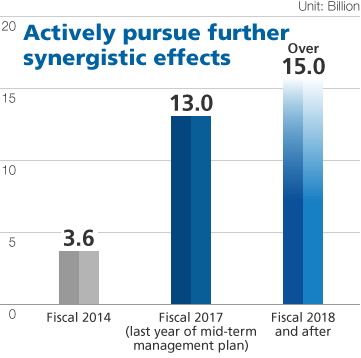
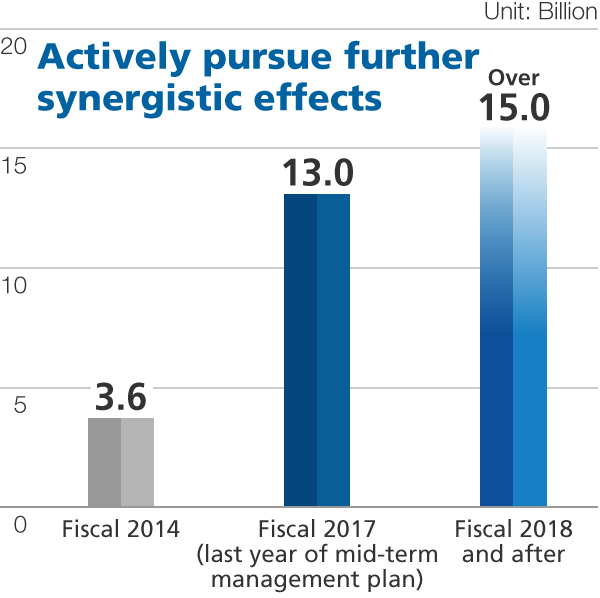
| Fiscal 2014 Results | Fiscal 2017 Targets | |
|---|---|---|
| Consolidated net sales | 572.5 billion yen | 700.0 billion yen |
| EBITDA | 48.8 billion yen | 67.0 billion yen |
| Operating income | 23.7 billion yen | 40.0 billion yen |
| Ordinary income | 21.3 billion yen | 35.0 billion yen |
| Shareholders' equity | 172.3 billion yen | 195.0 billion yen |
| Shareholders' equity ratio | 25.4% | 28 % |
| Interest-bearing debt | 296.0 billion yen | 260.0 billion yen |
| D/E ratio | 1.72 times | 1.33 times |
| ROE | 5.3% | 10 % |
Policies and Measures for Flat Rolled Products Business
- Improve cost competitiveness by reallocating product mix
-
- Increase productivity by reallocating rolling processes at the Fukui and Nagoya works
- Specialize the Fukaya Works in thick plate and finishing processes, and the Nikko Works in finishing processes
- Suspend use of surplus equipment by reallocating product mix in Japan
- Reduce capital expenditures by transferring surplus equipment to locations such as UATH
- Optimize global supply network
-
- Optimize production distribution and implement complimentary network for manufacturing bases in Japan, Thailand and America
- Reduce costs and improve quality through technological synergies
-
- Improve production costs by expanding advantageous technologies and quality control structures at each base to other sites, reduce energy usage, and increase production and minimize loss
- Early startup of fully-integrated manufacturing at Rayong Works of UACJ (Thailand) Co., Ltd. (UATH)
-
- Establish fully-integrated manufacturing network
- Differentiate by improving competitiveness
- Function as first-class aluminum works in Asia
- Proceed with BiW business in North America (joint venture with Constellium N.V.)
-
- Provide high-quality products by combining the technologies of UACJ and European company Constellium N.V.
- Invest in plant and equipment and prepare supply network
- Realize fully-integrated manufacturing in North America
| Extrusion Business |
|
|---|---|
| Foil Business | Become a comprehensive foil manufacturer in the global market
|
| Casting and Forging Business |
|
| Copper Tubing Business | Increase profits by developing and expanding sales of unique products, and maximizing current facility capabilities |
| Precision-machined Components Business | Improve business structure efficiency, concentrate heavily on main businesses in Japan and overseas, and develop new fields of demand |
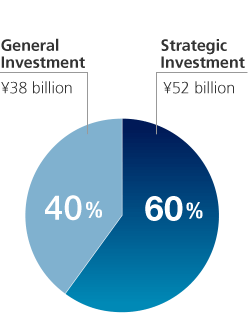
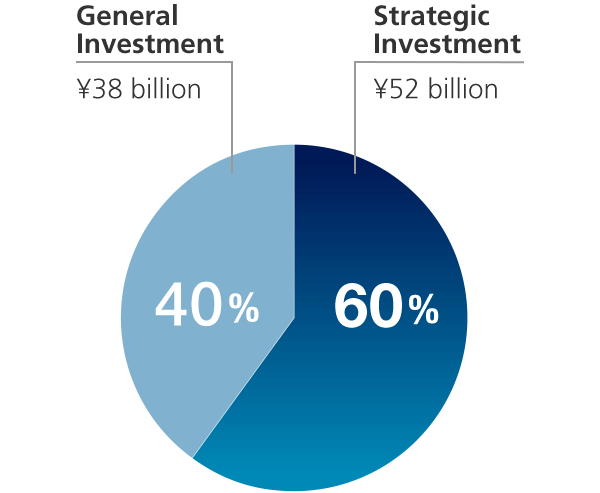
Our Approach to CSR
Fulfilling our responsibilities to stakeholders as a company trusted by society.
Both corporate social responsibility (CSR) and environmental, social and governance (ESG) management are indispensable to any corporation looking to achieve everlasting growth. As UACJ Group operations focus on aluminum, a metal with low environmental impact, above all else, one of the most important responsibilities as a corporation is to contribute to lower environmental impact on society as a whole through our businesses.
Recognizing this, the Group strives to ensure appropriate communications and build good relations while fulfilling its responsibilities to the many diverse stakeholders, including customers, shareholders, investors, suppliers, employees and communities. In order to do this, and to better respond to the wide range of appeals from society, we have established a CSR Committee. The committee is chaired by the company president, with other members consisting of executive officers and general managers from plants and corporate headquarters.
As the use of aluminum grows more widespread, our aim is to contribute to reducing environmental impact on our customers and society. In parallel to this, all members of the Group strive to continuously lower the environmental impact of business activities, including reducing energy consumption, environmentally hazardous emissions and waste. Additionally, as a manufacturer, we are fully committed to the responsibilities of ensuring product safety, quality management, and employee health and safety.
We also place a focus on strengthening corporate governance throughout the Group. We promote corporate ethics by adhering to UACJ's Management Philosophy and Code of Conduct, and through corporate supervision via the Board of Directors and Audit and Supervisory Board, and thorough compliance and risk management.
Future Outlook and Shareholder Returns
Anticipating further growth, we ask for your continued guidance and support.
Regarding the forecast for fiscal 2015, while startup of the UATH Rayong Works will continue to incur costs, we also expect further post-merger synergies to develop from the effects of integration. An increase in the sales of thick plate for LNG tankers is also anticipated as the import of shale gas from North America and Canada commences. However, we expect to see an adverse effect on inventory valuation due to a drop in the market price of aluminum ingots.
As a result of these factors, as of July 31, 2015, we have amended the full-year forecast for fiscal 2015. We are now forecasting net sales of ¥610 billion, operating income of ¥17 billion, ordinary income of ¥13 billion, and net income of ¥6 billion.
Regarding dividends, we consider a stable and continuous return on investment as an important commitment. At the end of fiscal 2014, we distributed a dividend of ¥3 per share. For fiscal 2015, we expect to distribute an interim dividend of ¥3 per share and year-end dividend of an additional ¥3, for a yearly total of ¥6 per share.
In terms of forecasting further on, plans are to continue expanding production capacity at the UATH Rayong Works, where a fully-integrated manufacturing system was completed in August 2015. It is believed this will strengthen the global production network and enable sales overseas to be increased. Furthermore, with the export of U.S. shale gas to Japan scheduled to begin in 2017 and export of Canadian shale gas scheduled to begin around 2018, demand for the thick plate used in the construction of LNG tankers—one of our principal products—is expected to increase greatly, and should contribute significantly to sales.
As we look forward to these exciting challenges, we wish to humbly request your continued guidance and support.


